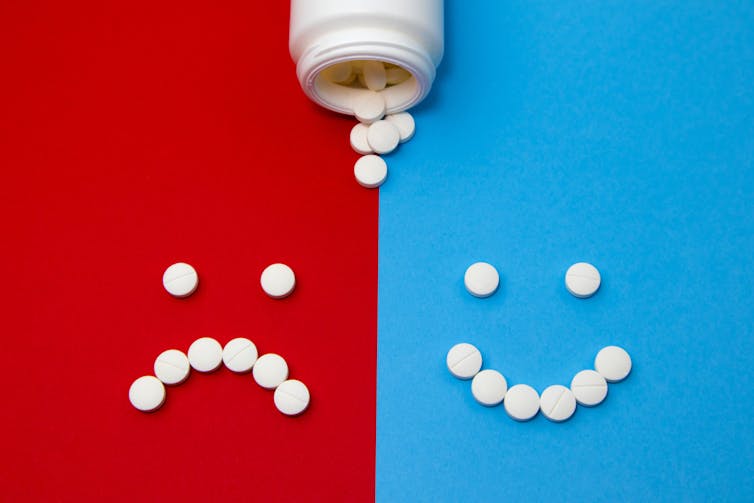
During my work as a clinical psychologist and neurobiologist, I have spoken with many individuals who are considering taking antidepressant medications such as selective serotonin reuptake inhibitors (SSRIs). Many ask me for my thoughts on whether they need medication, whether the talk therapy will be enough or whether they are “strong enough” to get over it without medications.
I always make a point of listening to their reasons for taking medications versus their hesitations. While many are reasonable, such as potential interactions with other health conditions, I also hear many unfounded reasons over and over, suggesting that myths underlying antidepressant hesitancy exist deep in our collective psyches.
Given the rising rates in depression and anxiety, it is time to talk about how treatments work and why people hesitate so we can make informed treatment decisions — especially when hesitations may not be grounded in science.
Here are some of the most common myths I hear, along with my responses:
Myth 1: I am stronger if I do this without meds
Overcoming depression is like overcoming a broken leg. You could be an extremely strong competitive weightlifter, but if your leg is broken you cannot use it in the same way. You may be an incredibly strong person psychologically but if you have depression, your brain is no longer responding to everyday life in the same way and it needs to “heal” before you can expect it to function like it did pre-depression.
Myth 2: I will be dependent on antidepressants to be happy
Antidepressants don’t make people happy; they allow people to experience all emotions in an appropriate and balanced way. Antidepressants do not offer immediate symptom relief, in fact they take four to six weeks to take full effects. However, they are a long-term (typically at a minimum for a year) and (hopefully) curative treatment, much like chemotherapy for certain types of cancer. With chemotherapy, you typically have to do a certain number of treatments over a prescribed time in order to kill the cancerous cells and be considered in remission.

Similarly, most studies show that if you take antidepressant medications for a year before coming off of them, the majority of people will not relapse. That means you will likely need to take them for a certain period of time to maintain the effects, but the effects will often remain long after you stop taking them. However, a small portion of people have a more chronic form of depression and may need to remain on medications for longer periods.
Myth 3: Meds will change who I am, I will be different or feel high
Antidepressant medications do not make people feel “high.” They don’t change what you know, what you learn or who you are, but they do allow you to view things from a more balanced perspective. I once heard a patient describe taking antidepressant medications quite simply: “I still see the same good and bad things, but when I was depressed I seemed to only pay attention to the bad and now I pay attention to the good as well.”
Myth 4: I will become addicted
Antidepressants taken as prescribed are generally not addictive and have a low potential for misuse. Antidepressants are not associated with things like cravings for the drug, as seen with addictive medications like opioids. Some patients report withdrawal symptoms such as headache or nausea when they stop taking certain antidepressants suddenly, but these are generally short-lived and can be minimised by tapering off treatment slowly.
Myth 5: Meds should only be used as a last resort
Reserving antidepressants only for extreme cases doesn’t make sense for several reasons. First, it is a matter of quality of life: depression hurts. It hurts the sufferer, the people around them, work productivity and has immense societal consequences. The financial repercussions that can be attributed to depression in terms of the number of work days missed, jobs lost, accidents caused, etc. are enormous.
We actually have medications that can help, are not addictive and have been around for long enough that long-lasting effects following treatment have been studied. To date, major long-term consequences of taking antidepressants as prescribed have rarely been observed in the short-term, though new evidence suggests that long-term antidepressant use (10 years or more) may be associated with increased cardiovascular disease risk. Though it is important to note that depression itself is also associated with increased cardiovascular disease risk.
So, if it improves someone’s quality of life — their concentration, their sleep, their relationships, their ability to work or to be present as a parent, decreases worry or helps them find the energy to do things they enjoy — why not consider the treatment?
Another factor in favour or treatment is that while major long-term negative consequences of taking antidepressants for a depressive episode have not been observed, the major long-term ramifications of living with depression have absolutely been observed. Depression significantly increases risk of cardiovascular disease, gastrointestinal disease, respiratory disease and Parkinson’s disease, to name a few. It also seems to worsen the outcomes for cancer.
If taking the medication is generally not associated with long-term health consequences but living with depression is, then the answer seems straightforward.
Treating depression

I am not suggesting that everyone with depression should take medications. Of course, this is something to be discussed with your doctor and there may be reasons why this would be a good or bad option for you.
Like any treatment, antidepressant medications do have side-effects and may pose risks to certain patients. If you are going to therapy or getting support in other ways and you see improvement, then by all means continue. But, if you are struggling and have held out on considering medications because of antidepressant hesitancy myths, maybe reconsider and discuss the possibility with your doctor.
It is also important to note that generally, the number of people that show improvement with talk therapy or by taking antidepressant treatments is similar (around 50-60 per cent). However, combining antidepressant medication with talk therapy is associated with greater improvement and a significantly reduced likelihood of relapse.
One theory as to why this occurs is because antidepressants increase neuroplasticity, which then leaves the brain in a better position to retain and exercise the gains made in therapy. One might think of antidepressants as therapy boosters in this case.
Antidepressant medications have evolved extensively from the first-generation medications used in the 1950s. There are now lifetimes of data about the long-term effects and underlying functions. Newer medications are now largely designed based on scientific theory.
Debunking the myths surrounding antidepressants is critical to permitting educated treatment decisions for those who suffer.
Natalina Salmaso, Associate Professor, Canada Research Chair in Behavioural Neurobiology, Clinical Psychologist, Carleton University
This article is republished from The Conversation under a Creative Commons license. Read the original article.











